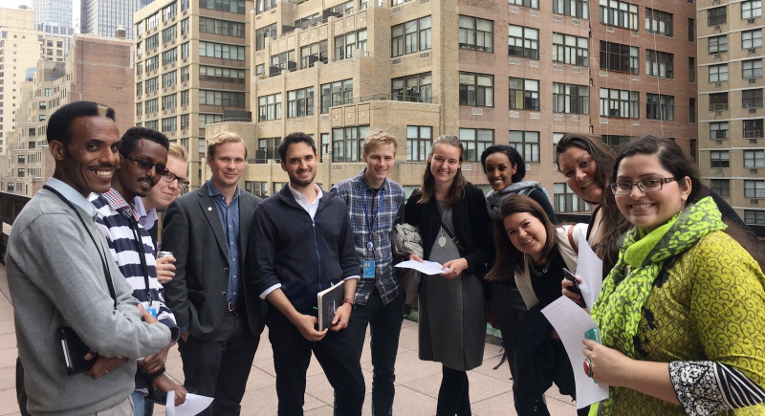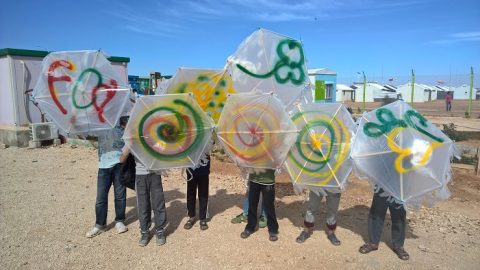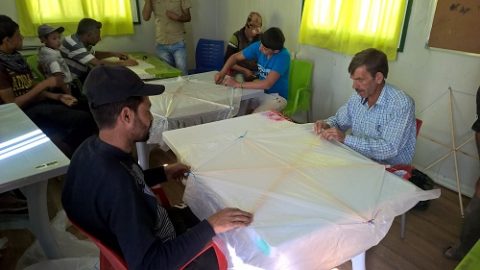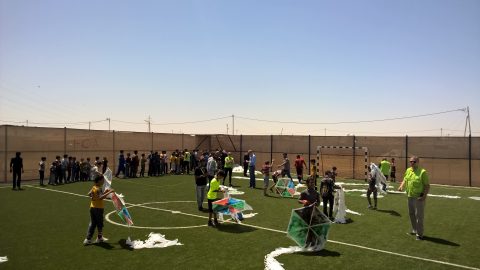Despite increasing attention to the severe refugee situation in Uganda, the international community has done little to ease the crisis as it reaches a grim milestone. This is what’s going on.
1. Uganda is home to more refugees than any other country in Africa
With 1,3 million refugees by August 2017, Uganda hosts one of the largest refugee populations in the world. The reason behind the severe influx is the conflict in South Sudan. Each day an average of thousands of refugees have crossed the border to Uganda since fighting re-erupted in the capital Juba in July 2016. Within the region, Uganda has received the highest number of South Sudanese refugees, now one million.
The number of internally displaced people included, four million South Sudanese have left their homes, and this makes it one of the largest refugee crises globally. Only Syria and Afghanistan are producing more refugees.
2. An overwhelming majority of the South Sudanese refugees are women and children
More than 85 percent of the South Sudanese refugees in Uganda are women and children, who have traveled by foot to escape a devastating civil war. According to their stories, adult males – brothers, fathers and husbands – have been killed, captured or recruited by armed groups. Opportunities for education and livelihoods are therefore extremely important for this refugee population.
61 percent of the South Sudanese refugees who have arrived since July 2016 are children under 18 years old. Having access to protective and quality education is an essential part of the rehabilitation process for these children whose childhood has been cut short through horrific experiences while fleeing their homes. The provision of education to these children does not only give them hope for a better future, but it also affirms them that their futures are worth believing in.
3. Uganda is at a breaking point
Uganda has one of the most progressive refugee policies in the world. After registration, refugees have the right to study, work, set up enterprises and move freely within the country – all the same rights as native Ugandans apart from the right to vote. Refugees also receive a plot of land at the refugee settlements for cultivation.
But Uganda is also one of the world’s poorest countries. The pace of arrivals has been tough to keep up with, and the UN has warned that Uganda is at a “breaking point”.
4. Uganda needs international support to maintain its transformational refugee policies
Uganda needs the support of the international community to keep . The UN Refugee Agency UNHCR says it needs around 570 million euros to ensure minimum humanitarian standards are met properly, but this far it has received only 17 percent of it.
The funding gap delays projects like providing permanent shelters by months and people are vulnerable to changing weather conditions. Children attend schools in temporary tents, easily taken down and destroyed by high winds and rains. Food rations have been cut several times and creating new plots for farming is an enormous task as new settlements open.
Text: Erik Nyström
Finn Church Aid supports education and livelihood opportunities for refugees in Uganda. Read more about our work here. Read an interview with Uganda’s refugee commissioner here.
Digital and tech workshops in Greece by Finn Church Aid support integration and expand the horizons of young people by offering skills that are vital in today’s digital world. After a successful two-month pilot in Athens, the plan is to expand to other locations in Greece if suitable partners jump onboard.
Since May 2017, a group of 40 young girls and boys from Greek and refugee communities have been learning digital and tech skills such as programming, robotics and 3D printing in Athens. The purpose of these workshops is to offer youth from different backgrounds an inspiring space to meet and learn together. Mixed groups allow newcomers and Greek to get to know each other, which supports integration.
Over 120 young people applied for the pilot workshops that Finn Church Aid (FCA) is organizing together with Greek NGO Open Technologies Alliance. Selected participants are aged 15 to 18. Half are newcomers from countries such as Syria, Iraq, Afghanistan, Pakistan, Bangladesh and Romania. The other half are Greek. No previous knowledge in computing sciences was required, only basic English language skills and a desire to learn.
“The large number of applications shows that there is a huge demand for this kind of training. We want to reach young people who do not have other opportunities to learn digital skills and who can benefit greatly from these competencies,” says FCA education specialist Laura Vanhanen.
“FCA has been successful in leveraging some of the best practices from the Finnish education system and creating new solutions and services for education needs in refugee contexts. In Greece our goal for these tech workshops is to offer youth access to relevant skills.”
Workshops are organised in an open technology lab which FCA set up at Impact Hub Athens. The trainers are computing experts from Greek open source and open data communities. After a successful pilot, FCA is looking for partners to scale up in other parts of Greece.
“We want to support youth in learning new skills, but also contribute to integration – offer a place to get to know one another. As the refugee population becomes an integral part of the European landscape, it is critical to find new ways resulting in social cohesion. Learning to code together motivates to collaborate,” Vanhanen says.
The economic crisis has had its toll on Greek youth. Over 45 per cent of the youth are unemployed, and the figure is among the highest in Europe. There are approximately 20 000 refugees under the age of 18 living in Greece at the moment. Most of them do not have access to education.
“Python is the number one programming language and I have already learned the basics,” rejoices Said, 18, from Afghanistan, who has been studying with FCA and wishes to continue studying in autumn.
Code+Create workshops are organised by Finn Church Aid together with Greek NGO GFOSS – Open Technologies Alliance.
Today the international community discussed the humanitarian crisis in Syria in Helsinki. In the Supporting Syrians conference, UN and partners launched the Regional Refugee and Resilience Plan (3RP) for 2017-2018. Education and employment of youth cannot be stressed enough.
Unemployment rates of youth in Syria and the neighboring countries are very high and a lack of future perspectives for youth is a fuel for instability, noted the recent Arab Human Development Report by UNDP. There are 2.7 million adolescents in Syria in need of assistance.
“It’s very welcome that both education and economic opportunities are included in the plan. However, more attention must be paid to linking these two aspects of the response to each other. We cannot invest too much in education and youth employment”, says Tomi Järvinen, Director of International Programme at Finn Church Aid.
Syrian children and youth have the right to quality education and livelihoods. Therefore, they should be provided for uninterrupted educational paths including secondary, vocational and higher education.
To achieve that, teacher training needs extra support. Dialogue with the private sector needs to be continued to ensure the relevance of the education for labor market needs. In addition, vocational and entrepreneurial training as well as funding for start-up entrepreneurs must be increased. In the same time, bureaucratic barriers hindering their aspirations have to be deconstructed. Children and youth in vulnerable situations also need psycho-social support.
“It is crucial to support employment of both Syrian refugees and host community youth at the risk of marginalization”, stresses Järvinen.
”Employment will also enable a flexible return home for refugees. They may have been able to save money maintain their working ability and possibly learn new skills.”
”It seems that both donors and Syrians are seeking new ways to earn a living, organise education and create jobs. Glimpses of hope are also in the air. Donors have also taken into account that we can learn from the survival mechanisms of the local communities.”
The education of Syrian children and youth cannot wait until the conflict ends; that the parties will be able to negotiate peace and Syrians will start the reconstruction. 40 per cent of adolescent children and youth are unable to go to school this winter, and the longer they wait the harder it is to go back – if not impossible.
Finn Church Aid supports Syrian refugees at refugee camps and surrounding host communities in Jordan. We provide youth and young adults with English and IT training as well as various professional skills training. We also provide young adults with recreational activities, such as sports and a circus school, which are intended to promote the psychosocial wellbeing of these young people who find themselves in a difficult situation.
In Syria we support food aid and education for internally displaced people through our partner International Orthodox Christian Charities (IOCC).
For further information:
Tomi Järvinen, Director of International Programme, Finn Church Aid, tel. +358 40 641 8209
The role of young people in peace processes was discussed at an event organised by FCA, the UN Permanent Missions of Eritrea and Finland and UNDP.
Two hundred UN diplomats, youth peacebuilders and civil society representatives were brought together in a unique way at the event Youth Leadership in Peace and Security in New York earlier this week.
The participants reflected on challenges in the cooperation between young people and governments, and presented ideas on how to overcome them.
“Now young people themselves got to express what they’re already doing for sustainable development and lasting peace”, said Joel Linnainmäki, representative of the National Youth Council of Finland, right after the event.
Almost half of the world’s population consists of under 25-year-olds. They make almost 60 per cent of the population in Africa and the Middle East. The participants of the event agreed that young people shouldn’t be treated as a threat or as trouble-makers, but instead recognised for the positive role they can play in peace processes, and for instance in preventing violent radicalisation.
There’s more young people in the world than ever before in history, and it’s increasingly clear that sustainable development and a lasting peace can’t be achieved without including the youth.
“Young people deserve and need a seat at the table in peacebuilding”, Deputy Secretary-General Jan Eliasson stated in his opening speech at the event.
Youth participation models should be exported from Finland
Ensuring the political participation of youth also requires economic inclusion and opportunities. Employment and quality education for young people as well as vocational skills must be taken into account.
Young people were recognized as active agents of change less than a year ago in the UN resolution 2250 Youth, Peace and Security in December 2015.
“In that regard, the composition of this event was extremely important. Young people themselves talked about the work they’ve done”, said this year’s UN Youth Delegate from Finland Sonja Huttunen.
According to Linnainmäki the event was a welcome step forward in the cooperation with Eritrean youth.
“At this point, the most important task is to broaden our cooperation and bring along other youth organisations in Europe and the Horn of Africa. We’re now planning a wider conference in Eritrea about youth leadership in peacebuilding”, he says.
The main objectives of Finland’s development policies aim to increase stability in developing countries, find employment and education opportunities for youth, and prevent radicalisation.
”Finland has a lot of experience in including youth in decision making, and should be proud of it. We have for instance ensured the participation of youth councils by law, and this could be applicable in other countries as well to bring youth voices to decision making tables”, said FCA’s adviser Laura Vanhanen, one of the organisers of the event.
You can also watch the event at the UN WEB TV.

The dialogue between Finnish and Eritrean youth continued in the Youth Leadership in Peace and Security event in New York. Photo: Laura Vanhanen /Finn Church Aid.
Youth delegates representing the Finnish youth:
Silja Markkula, Guides and Scouts of Finland & Allianssi – National Youth Council of Finland
Sonja Huttunen, The UN Youth Delegate of Finland 2016
Joel Linnainmäki, Allianssi – National Youth Council of Finland
Otto Ahoniemi, The Finnish Conscripts Union
Berghof Foundation and Finn Church Aid have started a research project to explore, through qualitative research, ‘youth spaces’ of mediation and dialogue – their characteristics, dimensions, challenges and potential. Stories from and on such youth spaces will be collected from different conflict contexts around the world and then reflected upon.
Youth-led social movements, change processes, violence-prevention and peacebuilding efforts have come to fore in recent years, partly due to the ‘youthfulness’ of the Arab Spring dynamics.
On the other hand, youth are also prominently featured in mainstream media in reporting socio-political violence such as those usually characterised as ‘violent extremism’. These are however neither new phenomena nor balanced perspectives. While there are many examples of youth transforming conflict across the globe, too often they go unnoticed or compete against the perspectives of youth as threat or at least trouble-makers. Having said that, there are impressive youth initiatives, many of which are guided by approaches of mediation and dialogue.
In conflict research however, there is a lack of reflection on the particularities of the youth approach to/in mediation and dialogue and on how this situates itself in the broader mediation and dialogue context involving other non-youth actors.
The study by FCA and Berghof Foundation is an attempt to fill this research gap.
This study situates itself within the broader follow-up of the recent United Nations Security Council Resolution (UN SCR 2250, December 2015) on youth, peace and security, which urges greater representation by young men and women in the prevention and resolution of violent conflict. It is also anticipated to contribute as a thematic paper to the Progress Study on youth, peace and security mandated by SCR 2250. In addition, stimulus from the process of this study will provide further justification for suggesting additional research of this kind and for concrete pathways towards a comprehensive (and/or follow-up) action research proposal.
The study will be ready in the fall 2016.
Text: Matthias Wevelsiep
Fleeing from killing and war, the refugee children have very few toys with them. Toys were left at home in Syria.
Kites are integral to spring in the Middle East. They’re everywhere in different shapes and colours. 440 children in the Zaatari and Azraq refugee camps received their own kites when Finn Church Aid organised kite workshops at both camps in the span of two weeks. The jarring, prospectless everyday life of a refugee was set aside for a moment as the colourful kites flew high above the camps.
“I am so happy”, said Khalil, who was flying his kite above the FCA compound.
“If only my kite could take me back home to Syria and there would be peace.”
Khalili’s friend Walid is also all smiles.
“It’s wonderful to fly my own kite! I couldn’t remember how fun this was!”

FCA workshop at Azraq refugee camp in Jordan brought lots of joy to Syrian children.
The fathers of some children had volunteered to build kites. Laths were nailed together into frames and then plastics were suspended on the frames. Painters gave the kites a final, colourful touch.
“This is the first time the kids have been able to fly kites since leaving Syria. It is sure to take their mind off of the gloominess of life as a refugee”, said Mohammed, who put together hundreds of kites.
Little Ahmad waited patiently in line for his turn to get a kite. When he finally got the colourful toy in his hands he sprung onto the sand yelling “I feel free!” at the top of his lungs.

Volunteers built kites for children at Azraq refugee camp.
Second grader Hamad pushed his friend Ahmed in a wheelchair in the soft sand. It was hard work but worth the effort on this special occasion. When the boys got their hands on a pair of kites, all signs of fatigue were instantly washed away as they just admired their colourful kites.
This wasn’t the first time Hamad had helped his friend Ahmed, Hamad pushes his friend to school and around the camp every day. The boys are inseparable. True friends help each other no matter how hard it is, seems to be the idea.
And when the boys finally got to fly their kites, Ahmed’s wheelchair was thoroughly put through its paces. Ahmed was very shy in explaining to us foreigners: “I wish I too could fly on my new kite back home, I wouldn’t even need a wheelchair!”

Volunteers building kites here on the football pitch of Zaatari refugee camp. This major event would not have been possible without their help.
An estimated 55% of Syrian refugees are under 18 years old. The future of Syria lies in children and youth, but do they have a future in Syria?
“I hope everything will go back to normal soon and we can go back to Syria”, said young Asma, smiling, yet wistful.
Everyone’s dreams and prayers seemed to share that wish as the kites soared to the sky.
The refugee situation in Jordan in April-May 2016
There are 638,633 registered Syrian refugees living in Jordan. However, the actual number of refugees in the country is estimated at 1.4 million. Finn Church Aid is working in the Azraq and Zaatari refugee camps and the surrounding host communities.
Azraq
30,059 refugees
57% children
21% under 5 years old
An average of 22 new-borns a week
3,000 children attending primary and secondary school
Zaatari
79,551 refugees
57% young people
19.9% under 5 years old
An average of 80 new-borns a week
20,771 children attending primary and secondary school
Source: UNHCR
Olli Pitkänen
Regional Programme Manager, the Middle East
Eritrean Minister of Foreign Affairs Osman Saleh Mohammed, Presidential Adviser Yemane Ghebreab and Ambassador Yonas Manna visited the Finn Church Aid offices on 14 April. The Eritrean delegation met with the Chairperson of FCA board, Tarja Kantola and Director of International Cooperation Tomi Järvinen.
The meetings provided an opportunity to take stock of the cooperation between Finn Church Aid and Eritrea in supporting Eritrean education sector development since the beginning of 2015. The meeting confirmed that since its inception, the cooperation has successfully contributed to the Eritrean education sector development, including the teacher education and curriculum development.
“The results of the ongoing cooperation are very encouraging”, said Kantola.
“FCA is committed to continuing its support to the Eritrean youth’s right to quality education”.
Youth employment in Eritrea was also discussed.
“FCA’s experience in diversifying and improving livelihoods, vocational training and linking learning to earning provide good opportunities to discuss further cooperation in Eritrea”, said Järvinen.
FCA is working in cooperation with Eritrean teacher training institutions and education officials to develop the capacities of teachers and teacher trainers to ensure that Eritrean children and youth have the opportunity to learn with professional and motivated teachers. FCA is also supporting the establishment of Eritrea’s first national innovation centre.
The delegation was in Finland by the invitation of the Ministry for Foreign Affairs of Finland.
For more information:
Director of International Cooperation, Mr. Tomi Järvinen, p. +358 40 641 8209



